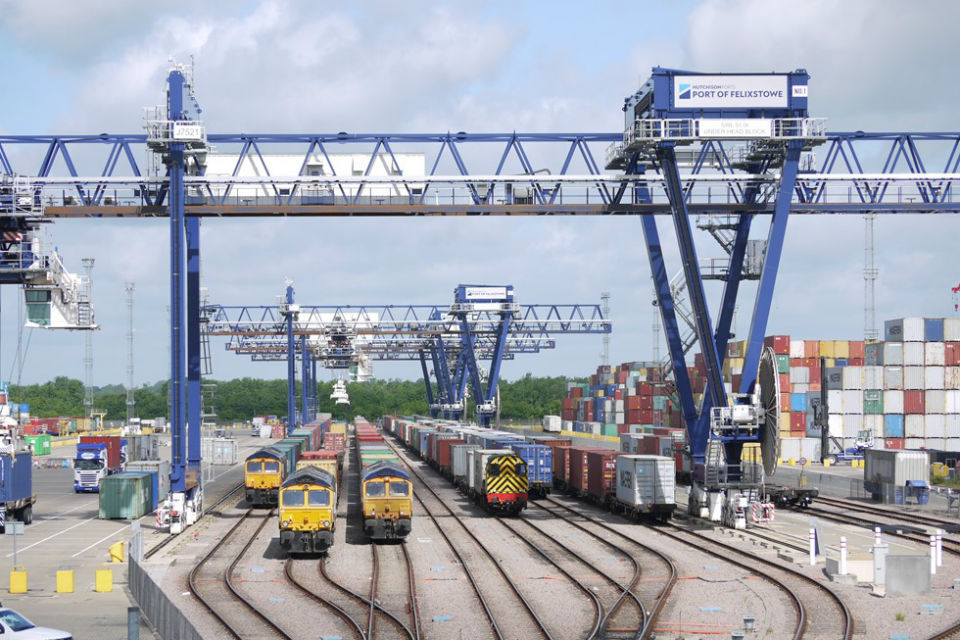UK freight growth on the horizon

Members of the influential Rail Freight Group believe that recovery for the sector is on the horizon and could lead the way for the British economy. That optimism, together with long term growth, is up for debate at the RailFreight UK Webinar on Friday morning.
Delegates at this Friday morning’s RailFreight UK Webinar will hear Maggie Simpson, chief executive of the industry representative body, the Rail Freight Group, deliver the results of their member survey. The findings, only just released, strike an optimistic note, with the majority of members upbeat about the prospects for rapid economic recovery, after the coronavirus crisis.
Survey and Summit
The survey comes just as the industry at large is gathering, online and under the current lockdown restrictions, to debate the route towards growth in the UK rail freight industry. Simpson will be joined by respected consultant Mike Garratt of MDS Transmodal, and communication head from HS2 Limited, Ben Goodwin.

In facing unprecedented peacetime demands upon its infrastructure, the rail freight industry has proved to be the backbone of the national supply chain. Without exception, operators have answered the call to keep vital food and medical supplies distributed around the country. Overall, they have also kept key industrial flows operating, and supported the planned maintenance effort around the entire network.
Difficult challenges facing industry
Maggie Simpson, who is the opening speaker at Friday’s RailFreight Summit UK, said the industry’s resilience was a strong positive factor in its potential for recovery and growth. However, it was not proving an easy task. ”Rail freight is playing a key role in keeping goods and supplies moving across the UK supporting the economy and communities”, she said. “The sector is also being adversely affected by these unique challenges, and our members are telling us of the difficult actions they are having to take to protect their businesses”.
Members though have shown their resilience in the crisis. The RFG survey has highlighted the challenges facing companies across the rail freight sector. Nevertheless it also offers hope that the recovery may not be as protracted as feared.
Significant interruptions to normal operations
The polling, conducted over the past two weeks, reveals significant interruption to normal operations. Despite the surge in essential supply work, firms have highlighting reduced demand and declining customer orders, cash flow concerns, business suspension, and interruption and delays in areas such as planning decisions.

The trains keep running though, and are providing a morale-boosting sight to many UK citizens, observing lockdown and suffering concerns over their loved ones, their health and their livelihoods. Yet that very visible contribution to the wellbeing of the nation has not come without cost to the industry.
Facts and figures
The majority of respondents had seen their businesses affected by the current situation, with just over half of those surveyed (54%) having closed parts of their business or expected to close soon. One percent more (55%) had already been required to take advantage of the UK government furlough scheme, which permits businesses to stand down staff without making them redundant, while the treasury reimburses 80% of wages.
Of those businesses standing down colleagues, 42% have furloughed more than a quarter of their staff, and a further 17% have asked more than half of their teams to stand down. In a reflection of the well-observed social distancing practices in the industry, absence has not been a significant issue. While there is no room for complacency, four out of five companies reported sickness levels below one in ten of the workforce.
Optimism for recovery
These figures are encouraging, and will feed into Friday’s debate. The immediate challenges are apparent, but there is cautious optimism over the return to economic normality. Nearly half of respondents (45%) expect their businesses to recover this year. A little more than a third think that recovery will take little more than six months. However, a significant majority (71%) expect the recovery to take more than two months.”It is encouraging to see that many businesses expect to see some return to normality this year”, added Simpson. “This will only happen with continued support from Government and a steady and considered approach to rebuilding business activity”.
Join the discussion on Friday
However, longer term, Friday’s speakers are confident that the sector will see encouraging growth overall, and the planning for that growth needs to begin now. With delegates from all around the UK, and many international attendees already registered, there seems to be considerable appetite for getting that planning process underway as soon as possible.

Growth planning for the future is the main topic this Friday. The free webinar session will give an opportunity to enter the debate. Details and registration for Friday’s RailFreight Summit UK webinar can be found here.
You just read one of our premium articles free of charge
Want full access? Take advantage of our exclusive offer




